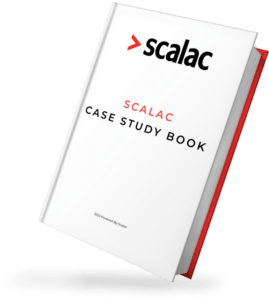
Dynamic member lookup in Scala

A lot of dynamic typed languages has function that catch all messages the target object doesn’t have. It gives these languages a lot of power to write DSL.
Scala 2.9 introduced an experimental option that enables this sort of dynamic handling of accesses to types in ways that would otherwise fail static type checking. It was refined and made non-experimental in 2.10, though it is still controlled through flag which is disabled by default.
Dynamic trait
Scala’s Dynamic type allows you to access instance members that aren’t statically defined in a class. It’s a marker trait with no members – it provides a hint to the compiler to rewrite method calls and field accesses to missing members as calls to one of the following methods:
selectDynamic– method allows to write field accessorsupdateDynamic– method allows to write field updatesapplyDynamic– method allows to call methods with argumentsapplyDynamicNamed– method allows to call methods with named arguments
To shed more light on how these methods might work see examples below together with overview of dynamic translations that are done under the hood:
dyn.foo //dyn.selectDynamic("foo")
dyn.foo = "bar" //dyn.updateDynamic("foo")("bar")
dyn.foo("bar") //dyn.applyDynamic("foo")("bar")
dyn.foo(name = "bar") //dyn.applyDynamicNamed("foo")(("name" -> "bar"))
dyn.foo(5, name = "bar") //dyn.applyDynamicNamed("foo")(("", 5),("name", "bar"))
dyn.foo("bar") = "rab" //dyn.applyDynamic("foo").update("bar", "rab")
So what you should do if you want to add dynamic member lookup in your code? It’s simple. You just need to write a class that extends Dynamic trait. Inside this class you can implement any of these four methods.
But that is not all. As I mentioned above it’s disabled feature by default so you need to set the compiler option -language:dynamics or add a import scala.language.dynamics to make the feature work.
And that’s all you need to do to make your statically typed code more dynamic.
Sample implementation
As an example, we might want to build our own Map implementation. Our Map needs to do few things: – store data as key-value, where key is String and value is Generic type, – return default(defined) value for keys that doesn’t exists.
We can do it like this :
class MyMap[T](defaultValue: T) extends Dynamic {
val values: mutable.Map[String, T] = mutable.Map.empty[String, T]
def selectDynamic(name: String): T = {
values.get(name) match {
case Some(value) => value
case None => defaultValue
}
}
def updateDynamic(name: String)(value: T): Unit = {
values(name) = value
}
}
So now we can use it in this way:
val myKeyStore = new MyMap(150) myKeyStore.foo //Int: 150 myKeyStore.foo = 69 myKeyStore.foo //Int: 69
How it works? I think, the code above is self-explanatory. Every time a message is sent to this object, it will try to find value with the key of a sent message in the included Map. If it doesn’t find any, it will return the value defined as default.
Going further
With Dynamic you can also create your own custom builders…
case class Ingredient(name: String, amount: Int = 1)
case class Drink(ingredients: List[Ingredient])
case class Shaker(ingredients: List[Ingredient], multiplier: Int = 1) extends Dynamic {
def selectDynamic(name: String) = {
name match {
case c if c.matches("with|and") => this
case double if double.matches("double|twice|two") => copy(multiplier = 2)
case triple if triple.matches("triple|three") => copy(multiplier = 3)
case ingredient => copy(ingredients :+ Ingredient(ingredient, multiplier), multiplier = 1)
}
}
def please = Drink(ingredients)
}
object Shaker {
def apply(): Shaker = {
new Shaker(List.empty[Ingredient], 1)
Now you can build you own drinks in easy way:
Shaker().gin.triple.vodka.twice.lemon.and.ice.please //result: Drink(List(Ingredient(gin,1), Ingredient(vodka,3), Ingredient(lemon,2), Ingredient(ice,1)))
Dynamic and implicit conversions
Implicit conversions are applied before missing methods are passed into updateDynamic, selectDynamic, applyDynamic or applyDynamicNamedmethod. To prove that, Lets go back to first example.
When we call key that doesn’t exists, the MyMap return the value 150.
myKeyStore.ten //Int: 150
Let’s see what happens with implicit conversion in scope. First we define implicit class:
import scala.language.implicitConversions
object DynamicImplicit {
implicit class Ten(obj: Any) {
def ten = 10
}
}
Import it in the file where we use our map, and try again to call method above.
import DynamicImplicit._ myKeyStore.ten //Int: 10
Dynamic and postfixOps
Sadly, it does not work well together. Compiler doesn’t know which method it should apply if you chain methods as in the example above. So, you have to use dot as methods separator.
More
You can read about Dynamic in the SIP17. If you want to read more about “modularization” of Scala 2.10 and feature flags you should look into SIP18
Do you like this post? Want to stay updated? Follow us on Twitter or subscribe to our Feed.
See also:









